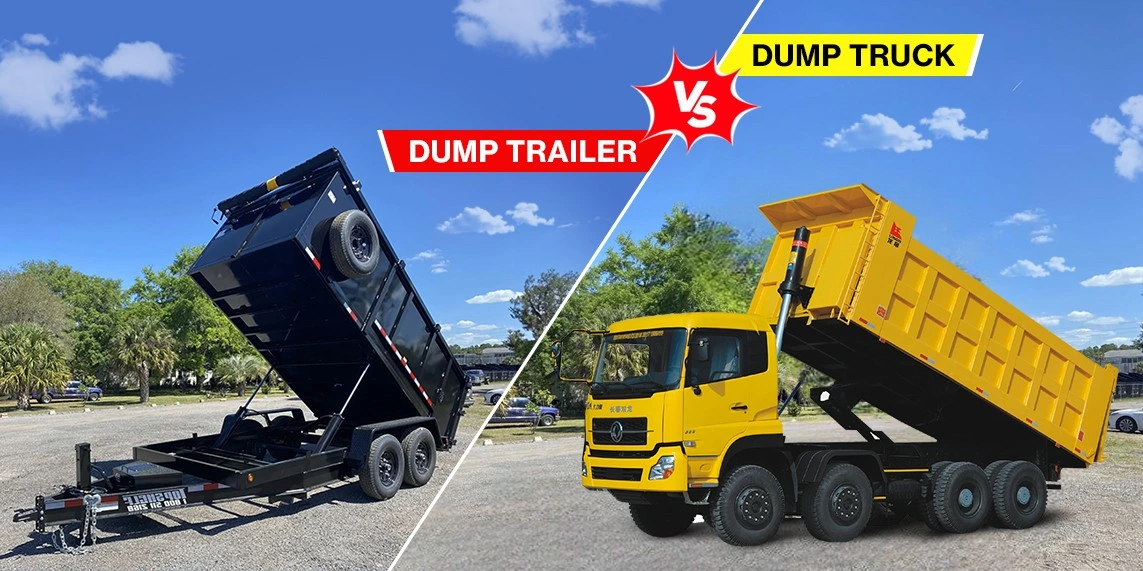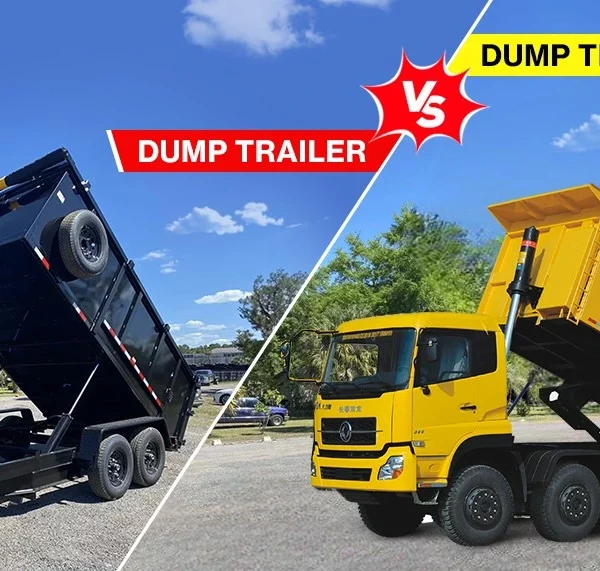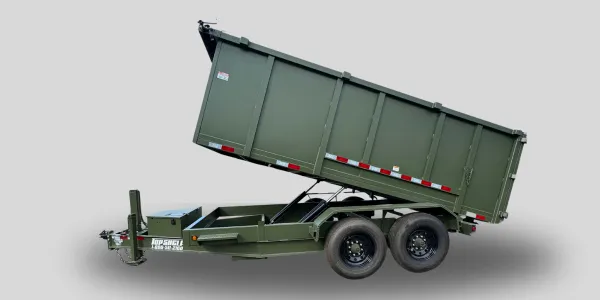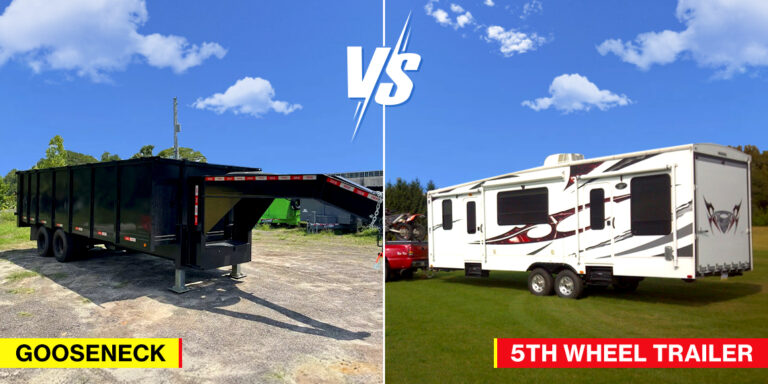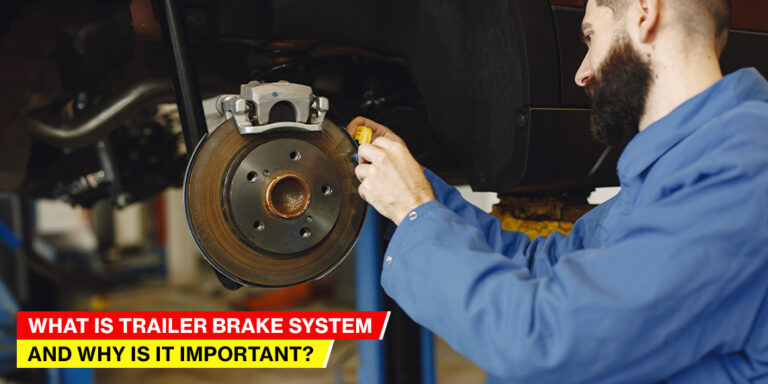The age-old debate of dump truck vs dump trailer continues to perplex contractors and haulers alike. This will be a fun read for a company dealing with heavy transportation elements.
So, which works best for loading your essential materials, a dump trailer or a truck?
Trucks and trailers are unique and beneficial choices but have some drawbacks. Deciding the ideal option for your business can be daunting.
Each is perfect for loading extensive material, and the vehicle bed efficiently tilts the cargo to drop the elements in space. Since both work fine for versatile situations, picking one requires a thorough comparison.
This blog explores the factors influencing their efficiency, from fuel consumption and payload capacity to maneuverability and operational costs. By the end of this exhaustive read, you will be equipped to make an informed decision for specific hauling needs.
Dump Truck vs Dump Trailer – Understanding Each
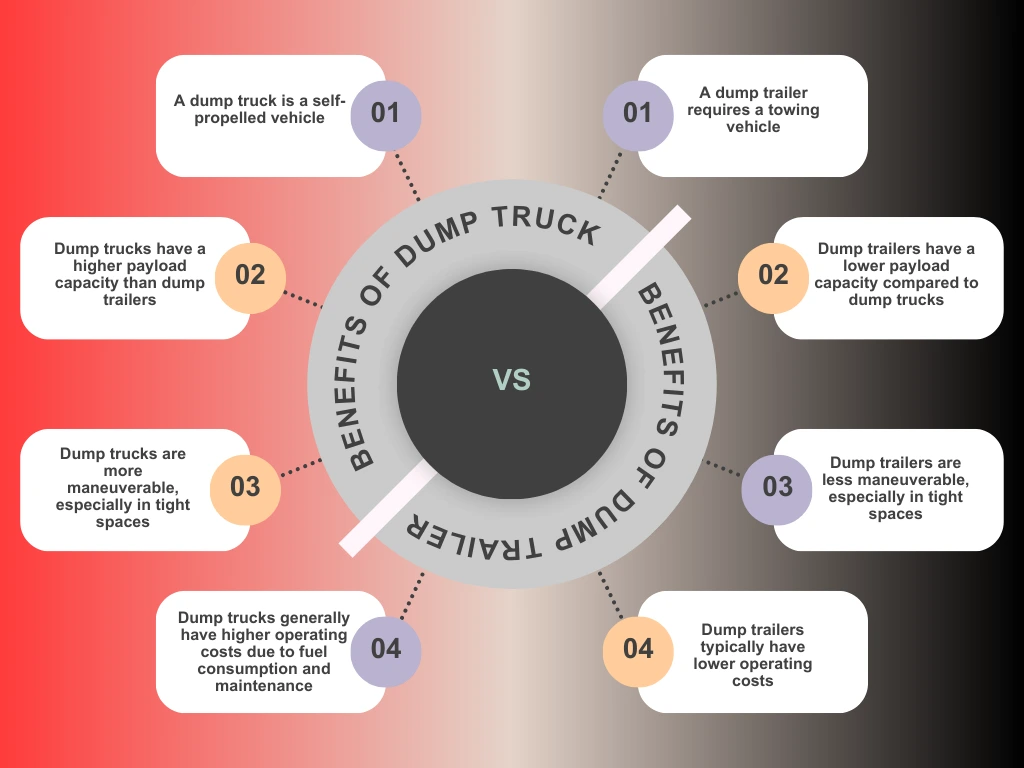
Decision-making becomes seamless when the fundamental concepts are clear. Therefore, in this section, let us understand what a dump truck and trailer are. We will also understand the key features of each and decide whether or not it is a lucrative option for your business.
What is a Dump Truck?
A dump truck, known as a dumper, is a heavy-duty vehicle designed to transport and unload large quantities of loose materials.
Dumpers are common at construction sites, mining operations, and other industries since they rely on efficient material handling.
Key Components of a Dump Truck
Here is what to expect when getting a dump truck –
- Chassis: A robust frame that supports the entire vehicle and its load.
- Engine: A powerful engine that provides the necessary power to haul heavy loads.
- Body: An open-box bed typically made of steel holds the transporting material.
- Hydraulic System: The system powers the lifting mechanism and tilts the bed to unload the material.
How a Dump Truck Works?
Here is a step-by-step procedure for using a dump truck
- Loading: The dumper is driven to the loading site and filled with materials, typically dirt, gravel, sand, or demolition debris. The objects are subject to change, depending on the business type.
- Transport: The loaded dump truck is driven to the designated unloading site.
- Unloading: This step is hassle-free. The hydraulic system lifts the truck bed, allowing the material to be dumped onto the ground or into another container.
Numerous sizes of dump trucks are available with capacities suitable for varied needs. Some designs are for off-road use, and others are highway transportation optimized. Trucks are crucial in construction and mining, improving efficiency and productivity.
What is a Dump Trailer?
Dump Trailers are the immediate alternatives and are powerful and versatile. Trailers have a specialized design to transport and unload bulk materials efficiently. They have a larger capacity and can manage colossal elements like mulch, trash, and metals.
Dump trailers are towed vehicles and require a truck or other towing vehicle to operate. Therefore, that choice is critical.
Several businesses prefer to dump trailers over trucks, especially industries like agriculture, mining, excavation, and disaster management organizations.
Key Components of a Dump Trailer
Let us take a look at the key elements of a dump trailer
- Chassis: A sturdy frame that supports the weight of the trailer and its load.
- Body: An open-box bed, often made of steel, to hold the material.
- Hydraulic System: This system powers the mechanism that tilts the bed to unload the material.
While trailer components are not significantly different from a truck’s, trailers offer a more significant advantage in loading capacity. They also add versatility and weight support and are an obvious choice for large-scale businesses.
How a Dump Trailer Works?
Here is a brief overview of how dump trailer works
- Loading: The trailer is attached to a towing vehicle and driven to the loading site. The material is loaded into the bed. The functionality is the same as the truck.
- Transport: The loaded and towed trailer reaches the desired unloading location.
- Unloading: The hydraulic system activates, lifting the bed and dumping the material in place.
Dump trailers offer flexibility and versatility for various applications, including construction, landscaping, and agriculture. They are often preferred for jobs that require frequent material loading and unloading at different sites.
Types of Dumper Trucks
Dump trucks are vital for large-scale construction, mining, and transportation. They have been around for over 100 years and are designed to efficiently transport and unload bulk materials. Different types of dump trucks are designed to optimize efficiency and productivity in specific applications.
Let us explore the available options in the market
Standard Dump Trucks
The standard dump truck is the most common type, characterized by its rear-tipping bed. This design is ideal for general-purpose hauling of materials, including dirt, gravel, sand, and construction debris. It is the most common option in the US and Europe.
Key Features:
- Rear-tipping bed with tailgate accessibility.
- Wide range of capacities with optimum maneuverability.
- Versatile for various applications with a low wheelbase.
- Suitable for both on-road and off-road use (depending on the model).
Transfer Dump Trucks
Transfer dump trucks are specialized vehicles designed for efficient material transfer between types of equipment. They are common in mining operations and large-scale construction projects.
This variant offers greater weight capacity without sacrificing maneuverability.
Key Features:
- Unique body design that allows for quick and effortless dumping.
- High-weight capacity, ideal for industrial use.
- Often used in conjunction with other heavy equipment.
- Perfect for transferring bulk materials over long distances.
Side Dump Trucks
The side dump truck design dumps their load to either side of the designated location. The feature is handy for applications where dumping directly onto the ground or into a specific area is challenging.
Additionally, the rapid unloading factor contributes to the advantages of picking the truck.
The variant is frequent across the US and the western sides and can carry everything, from boulders to sands.
Key Features:
- Side-tipping bed.
- Precise material placement.
- Ideal for road construction and maintenance.
- Often used for asphalt and aggregate hauling.
Off-Road Dump Trucks
Off-road dump trucks are heavy-duty vehicles designed to operate in harsh, off-road conditions. They are common in mining, quarrying, and construction projects in remote or rugged terrain.
As industry jargon goes, manufacturers rarely call these dump trucks but haul trucks for the services.
Key Features:
- Large tires and robust suspension for off-road capabilities.
- High ground clearance.
- Powerful engines.
- High payload capacity
- Specialized features like all-wheel drive and differential locks.
Several other variants are available, like the belly dump truck, super-dump truck, or end-dump truck – each with advantages and disadvantages. Choosing a dump truck variant ensures it matches your business or task requirements.
Getting the perfect match involves considering various factors
- The weight of the transported material.
- The type of terrain the truck will operate on (on-road or off-road).
- The desired angle of the dump bed.
- The required agility and turning radius.
- The importance of fuel economy.
- The cost of regular maintenance and repairs.
- The level of comfort and safety for the operator.
Some dump trucks are equipped with emission reduction technologies to minimize environmental footprint. Others even possess advanced safety features like automatic braking systems, stability control, and backup cameras.
Proper operator training is crucial for ensuring the safe and efficient operation of dump trucks. Knowing one’s needs and making an informed decision also helps improve operations.
Types of Dump Trailers
Now that we have learned about the various dump trucks let’s explore some dump trailer options. These trailers are versatile equipment used to transport and unload bulk materials. They can carry more, perform better, and even possess elevated maneuverability compared to trucks.
They are typically towed by a truck or other towing vehicle. They are available in various configurations to suit different applications.
Let us take a look into our options –
End Dump Trailers
End dump trailers are the most common type of dump trailers. Their characteristic feature is the rear-tipping bed, which allows easy unloading of materials onto the ground or into a specific location.
As the name suggests, the trailer unloads from the rear, and the bed lifts in the air to unload the material.
Key Features:
- Rear-tipping bed.
- Wide range of capacities.
- Versatile for various applications.
- Suitable for both on-road and off-road use (depending on the model).
- Not ideal for hauling liquids.
Side Dump Trailers
Like side dump trucks, side dump trailers are designed to dump their load to either side. They are ideal for applications where the load is deposited directly onto the ground or a specific spot with limited space.
The overall feature was introduced in the 90s to eliminate dangerous material loss incidents. Compared to the end-dump trailer, the entire bed does not rise. Instead, tilting on one side offers more stability, especially when handling valuable material.
Key Features:
- Side-tipping bed.
- Precise material placement.
- Ideal for road construction and maintenance.
- Often used for hauling construction and mining elements.
- Offers greater stability.
Bottom Dump Trailers
Bottom dump trailers, also called belly dump trailers, are designed to unload materials through a hydraulically operated gate at the bottom of the trailer. The clamshell door feature offers specific types of applications during material hauling. They are ideal for applications where precise placement of materials is required, such as filling hoppers or stockpiles.
Additionally, belly dump trailers enable windrowing – unloading material in a line rather than a pile. However, they cannot handle liquid or fine elements since they might seep out of the door hinges.
Key Features:
- Bottom-opening gate.
- Precise material placement and windrowing.
- Ideal for applications requiring controlled unloading.
- Often used in agriculture and construction.
Gooseneck Dump Trailers
As the name suggests, the gooseneck dump trailer has a hooked end that connects to the towing vehicle for elevated stability and control. Most gooseneck dump trailers are customary among construction or landscaping professionals.
Compared to the other variants of trailers, these have a greater load capacity and distribute weight on the rear axle. This leads to less damage to the towing vehicle and is an ideal choice for safe cargo movement.
Key Features:
- Adjustable Gooseneck coupler.
- Open box bed for easy hauling.
- Tighter turn radius.
- Greater maneuverability.
- More room for cargo.
Specialty Variants
In addition to the standard types of dump trailers, there are specialty variants designed for specific applications –
- Live Bottom Trailers: These use a conveyor belt system to unload materials and are ideal for sticky or difficult-to-unload materials like asphalt or mulch.
- Pup Trailers: These are smaller and towed behind a larger trailer, increasing overall payload capacity.
- Hydraulic Tailgate Trailers: These have a hydraulically operated tailgate. It can be raised or lowered to facilitate loading and unloading.
- Low-Profile Trailers: These have a lower profile to reduce overall height, making them suitable for transporting oversized loads.
When selecting the right dump trailer, consider the mentioned factors –
- The weight of the transported material.
- The type of terrain the trailer will operate on (on-road or off-road).
- The desired angle of the dump bed.
- The required agility and turning radius.
- The features it offers.
- The type of material to be transported (e.g., loose, sticky, or granular).
- The specific needs for material placement and unloading speed.
- The towing capacity of the truck or other towing vehicle.
Remember, regular maintenance is essential to ensure the longevity and performance of dump trailers. Hire proper trailer operators to ensure safe and efficient material handling. Consider the trailer types and selection factors before making an informed decision about your business needs.
Advantages of Dump Trucks
Dump trucks offer numerous advantages, making them indispensable in various industries, including construction, mining, and agriculture.
Here are some of the key benefits to note –
High Productivity
- Efficient Material Transport:
The dump truck design helps transport large volumes of material efficiently, reducing the number of trips required to complete a task. - Rapid Unloading:
The hydraulically operated dumping mechanism allows quick and easy unloading of materials, minimizing downtime.
Versatility
- Diverse Applications:
Dump trucks handle a range of materials, from loose soil and gravel to heavy construction debris. - Adaptability to Various Terrain:
Dump trucks can operate on various terrains, including off-road conditions, thanks to different tire configurations and suspension systems.
Cost-Effective
- Reduced Labor Costs:
Dump trucks significantly reduce labor costs by automating the material handling process. - Fuel Efficiency:
The modern dump truck designs are fuel-efficient and reduce operating costs.
Safety
- Operator Protection:
Many dump trucks have safety features, including roll-over protection systems (ROPS) and seatbelt restraints to protect operators.
Improved Visibility: Advanced lighting systems and large windshields enhance visibility, reducing the risk of accidents.
Environmental Friendliness
- Emission Reduction:
Modern dump trucks have advanced emission control systems to minimize environmental impact. - Sustainable Material Handling:
Efficient transport and reduced fuel consumption contribute to sustainable practices.
Durability and Reliability
- Robust Construction:
Dump trucks can withstand harsh working conditions and heavy loads. - Reliable Performance:
Regular maintenance and quality components ensure performance.
Understanding the numerous advantages of dump trucks helps businesses make informed decisions about what to choose and maximize their efforts.
Dump Trailer Advantages
Dump trailers offer advantages for their elevated versatility and efficient solutions for transporting and unloading bulk materials. While trucks are ancient, trailers are modern, with unique features catering to the expanding industry requirements.
Here are some of the key advantages of using dump trailers –
Flexibility and Portability
- Easy Towing:
Dump trailers can be easily towed by various vehicles, including trucks, pickups, and SUVs, providing flexibility for different transportation needs. - Compact Storage:
When not in use, dump trailers can be stored in a garage or other storage area, saving space.
Cost-Effective
- Lower Initial Cost:
Compared to dump truck costs, dump trailers often have a lower initial purchase cost. - Reduced Operating Costs:
Lower fuel consumption and maintenance costs contribute to significant savings over time.
Versatility
- Diverse Applications:
Dump trailers have numerous applications, including construction, landscaping, agriculture, and waste disposal. - Adaptability:
Different types of dump trailers, like end-dump, side-dump, and bottom-dump, offer versatility for specific needs.
Efficiency
- Rapid Unloading:
Hydraulic-powered dumping mechanisms allow quick and efficient unloading of materials. - Increased Productivity:
Dump trailers increase productivity on the job site by streamlining the material handling process.
Safety
- Improved Maneuverability:
Dump trailers are generally more maneuverable than dump trucks, reducing the risk of accidents. - Enhanced Visibility:
Proper lighting and signage improve visibility, especially during nighttime operations.
Environmental Friendliness
- Reduced Emissions:
Dump trailers help reduce emissions by diminishing the number of trips required to transport materials. - Sustainable Practices:
Efficient material handling and reduced fuel consumption contribute to sustainable practices.
When selecting the dump trailer, consider these specifics: The application needs to maximize efficiency, productivity, and cost-effectiveness.
Dump Truck or Dump Trailer: The Prime Differences

Deciding whether to go for the dump truck or trailer is daunting. Each is unique, and several factors are worth considering. For instance, efficiency, cost-effectiveness, and overall suitability of the equipment for your specific needs have a significant impact.
Let us quickly go for a cursory glance at the differences –
Payload Capacity
Dump Trucks have a higher payload capacity, making them ideal for large-scale projects with large volumes of material. They can handle heavy loads and efficiently move large quantities of cargo over long distances.
While dumper trailers are designed to handle substantial loads, their capacity is unique and varies among the different types of hauling trailers available. However, the ideal towing vehicle enhances overall vehicle capability.
Maneuverability
As self-propelled vehicles, dump trucks offer superior maneuverability, especially in tight spaces and off-road conditions. They can navigate challenging terrain and are ideal for construction sites, mining operations, and other demanding environments.
As towed vehicles, dump trailers rely on the maneuverability of the towing vehicle. They are maneuverable, especially when paired with a powerful truck. Beginner hands may be less agile than dump trucks in certain situations, particularly in tight spaces or off-road conditions. We recommend hiring a professional for the maneuverability.
Operating Costs
Dump trucks generally have higher operating costs due to factors involving fuel consumption, maintenance, and driver wages. Their increased productivity and ability to handle heavy loads can offset their higher initial cost and ongoing operating expenses.
Dump Trailers typically have lower operating costs, as they share the engine and fuel consumption with the towing vehicle. Additionally, maintenance costs are often lower for trailers compared to trucks. It makes them a more cost-effective option for smaller-scale projects or those with lower-volume material transport needs.
Initial Investment
The initial investment for a dump truck is significantly higher than a dump trailer’s. The cost of the vehicle itself, as well as the engine, transmission, and other components, creates a bulk. Additionally, dump trucks require specialized licenses and insurance, which adds to the overall cost of ownership.
The initial investment for a dump trailer is generally lower, especially when considering the cost of the towing vehicle. However, the cost of towing vehicles must be factored into the overall investment. A trailer is all you need if you possess a quality towing vehicle.
Dump Truck and Trailer: Choosing the Perfect Option
The optimal choice between a dump truck and a dump trailer depends on several factors. We request scanning through these aspects before making the ideal decision.
Project Scope
A dump truck may be the most efficient for large-scale projects with high-volume material transport. A dump trailer is ideal for smaller projects with frequent loading at different sites.
Terrain
A dump truck’s superior maneuverability and off-road capabilities may be advantageous if the project involves off-road or challenging terrain. However, buying a dump trailer towed by a powerful truck is sufficient for on-road applications.
Budget
The initial investment and ongoing operating costs demand careful consideration. The dump truck may have higher upfront and operating costs and require a license. Trailers are a better option with additional features worth considering.
Whichever you prefer, it corners individual needs, and the ideal choice results in better outcomes.
Frequently Asked Questions
Some common dumping vehicle queries answered –
How heavy is a dump trailer?
The weight of a dump trailer varies significantly depending on its size, capacity, and specific features. Factors like the type of material used in construction, the size of the trailer bed, and additional equipment influence its weight. Generally, empty dump trailers can range from a few thousand pounds to tens of thousands of pounds.
How heavy is a dump truck?
The weight of a dump truck also varies depending on its size, model, and specific features. When empty, a typical dump truck weighs from 20,000 to 40,000 pounds. When loaded with material, the total weight can exceed 100,000 pounds.
What is the cost of a dump trailer?
The cost of a dump trailer ranges widely, depending on factors like size, capacity, brand, and additional features. A basic, smaller dump trailer might cost a few thousand dollars, while larger, more specialized trailers can cost tens of thousands.
What is the cost of a dump truck?
The cost of a dump truck varies significantly based on factors such as size, brand, model, engine type, and additional features. A new dump truck can range from tens of thousands of dollars to hundreds of thousands of dollars. Used dump trucks are more affordable; however, their condition and lifespan must be carefully evaluated.
Please Note: For the most accurate and up-to-date pricing information, you should stay informed of the trailer market. Prices fluctuate due to market conditions, economic factors, and specific regional costs.
Dump Truck vs Dump Trailer – Elevating Business Operations
Whether you are a contractor, landscaper, farmer, or business owner, a dump trailer or truck can be a game-changer. The application of both considerably enhances business operations, alleviating haul struggles.
We hope this comprehensive discussion on dump truck vs dump trailer was a fascinating and lucrative read.
As modern dump trailer manufacturers with experience in the market, we gravitate toward its elevated features and unique applications. Its versatility, ease of use, and cost-effectiveness make it a compelling choice for various applications.
We believe, with practice, that a dump trailer is more than a tool; it is a strategic investment that significantly enhances your operational efficiency and profitability.
However, if you deal with more prominent elements and have a bigger budget to explore, a truck is all you need for its unparalleled maneuverability and stability.
Streamline your material handling processes by making the ideal decision – your business will thank you.
For all your trailer needs, visit Top Shelf Trailers, best dump trailer manufacturers in United States.

